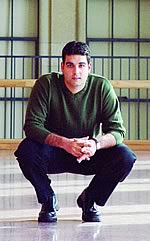 |
 |
 |
||||
 |
|
 |
|
 |
|
The Sidelines of American Politics
Although I played American football for seven years, my parents still don’t know a thing about the game. They were proud of me, therefore they came to my matches, but they were often uncomfortable in the crowd. They did not understand the rules of the game, so they were left feeling excluded or less important than the other parents. My memory of them, two Iranian immigrants sitting alone in the stands of Oberlin’s stadium, strikes a familiar feeling in me. As a first-generation American, shuffling between an American world by day and an Iranian one by night, I learned how to connect my separate, yet related lives. Early in life I learned the value of fortitude and tenacity in the face of alienation. I vividly remember my first day of elementary school. My lunch of Persian rice and cabbage stew didn’t seem as appealing as a Jello pack and a peanut butter sandwich. The awkward stares and dismissive eyes of my classmates lingered longer than I expected. Later, as a pudgy Iranian American boy playing middle school football, I was embarrassed to hear the announcer stumble through the syllables of my name. But it was these new experiences that helped me cultivate an identity of my own. Challenges on the football field often paralleled personal challenges in my life. Through football, I learned that understanding weakness is the first step toward developing new strengths. Today, every mispronunciation of my name presents an opportunity to enunciate my identity to an interested world, and I have learned to employ my personal strengths to empower others. As a Cole Scholar at Oberlin two years ago, I worked as an intern for the Democratic Party in Los Angeles. I was greeted my first day by the most mindless of tasks—a desk full of forms to enter into a database. By the end of the election cycle, I was hired as a full-time press deputy, work that has helped me discover my role as an advocate for communities that are often left out of the political process. My past struggles with identity had translated into a sensitivity and appreciation for people whose struggles are more often forgotten than remembered. And so, on top of my daily responsibilities as press deputy, I undertook the challenge of mobilizing California’s Iranian American electorate, the largest immigrant Iranian community in the world. Through a grant from Oberlin’s politics department, I was able to continue my post-Oberlin political work at the Democratic National Convention this summer in Boston. Although excited to participate in the proceedings, I shouldered some disappointment. The issues I care about—such as immigration and civil liberties—weren’t addressed by the speakers. I realize now that these conventions are more of a media opportunity than a true discussion of platform and policy; this is also the problem with our political verbiage. It’s no wonder that the communities I am part of aren’t interested in being involved in politics, when the things politicians talk about aren’t what matter to us. As an aspiring leader for the Iranian American community (and an idealistic Obie), I’m compelled to consider a vision for the future. While students at Oberlin care about political engagement, I’ve encountered too many who are apathetic or pessimistic about the outcome of political processes. Having spent much time at Oberlin understanding our complex political system, I received enough blank stares and shrugged shoulders to know that providing voter registration forms and political resources are not enough. Those mechanisms lack the true spirit of change: vision and goals. As an Obie, I think I possess the skills and values to promote that spirit—to show others that having an immigrant heritage means more than shared foods, music, and language. It means being part of a larger community that promotes a set of common principles. Moreover, it means recognizing that being politically active does not destroy our unique values, but rather ensures that these values will last through successive generations. There wasn’t much I could do to make my parents more comfortable in the football stands; the intricacies of American football may be simply inexplicable to many non-Americans. There is, however, something I can do for members of other marginalized communities. I can be an effective conduit to connect, and perhaps even integrate, the marginalized and mass societies. The position of other marginalized communities in our world is similar to my family’s experience: standing on the sidelines of the democratic political process, fighting to preserve our cultural heritage, struggling and often failing to find ways to join the mainstream. The struggle to become politically effacious is even more pronounced in political systems that do little to erase social boundaries. Whatever my future holds, I know that joining the fight for understanding will always be my highest priority. As a child, I would often try to figure out who I was—Iranian, American, Iranian American, American Iranian—or something else that would make me fit in. I realize now that there are no categories for people like me. We end up creating categories of our own. |
